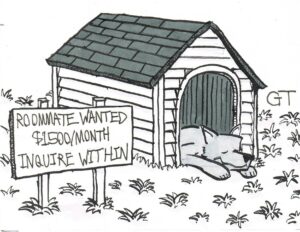Since 2022, the unhoused population has doubled in New Brunswick. With the increase of unhoused people, there is an increase in concern. Homelessness is a severe issue affecting our province, and many do not know how to help.

The Saint John Human Development Council found a drastic increase (107%) in homelessness in Fredericton, Moncton, and Saint John between 2021 and 2023. Over half of the homeless population in New Brunswick was from Moncton. Absolute homelessness is defined as a state of living on the streets or in emergency shelters. This study did not look at people who experience bouts of homelessness. Across Canada, there has been a significant increase in tent cities as well. Tent cities are informal communities of the unhoused made up of temporary housing structures, usually tents.
The growing homeless population is not only a problem in New Brunswick, this trend can be seen all over Canada. According to Homelessness Statistics in Canada, on any given night approximately 25,000 to 35,000 people are homeless. Looking more into the demographics of the unhoused population in Canada, 52% are 25 to 49 years old and 20% are 13 to 24 years old. Most youth end up living on the streets due to family issues. In addition, this study does not account for people experiencing “hidden homelessness.” Many people—primarily young people— do not have reliable housing and are often dependent on couch surfing.
With the housing crisis and financial challenges, many people do not have a place to call home. The housing crisis was exacerbated the COVID-19 pandemic, and many people are still facing the effects. Additionally, many homeless people are victims of abuse and have no place to go after they flee their harmful situations. Roughly 40% of the unhoused population reported having a mental illness, and 16.5% responded that their mental health was a contributing factor to their state.
Ending this article on a personal note, I think our attempts to solve this large social issue should be rooted in compassion. While researching this topic, I found numerous comments and articles placing the blame on people experiencing homelessness, blaming people experiencing homelessness, instead of acknowledging the societal issues contributing to increasing levels of homelessness. Several myths are circulating on the internet like “people choose to be homeless,” “homeless people should just get a job” and “all people who are experiencing homelessness are criminals or addicts.” These myths are simply not true and blaming victims does not address the underlying issues. Homelessness is a complex issue and many organizations are trying to help. The Homeless Hub, a social enterprise looking to end homelessness, suggests a housing investment strategy, citing poverty as the main issue in homelessness. They believe in implementing direct investments in affordable housing programs, an affordable tax credit and investments to target both people experiencing casual and chronic homelessness. This plan prioritizes the unhoused population in housing support systems. While many politicians disagree about how to address this issue, approaching the homeless epidemic with care and understanding for those struggling should be the main ambition.





